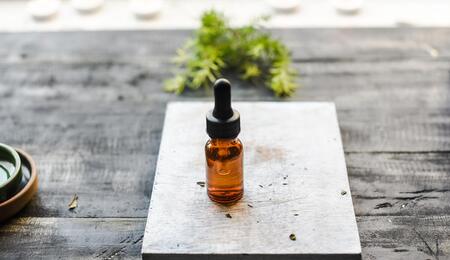What is CBD?

CBD, which is short for cannabidiol, is one of the two most famous medical compounds extracted from cannabis or hemp. Unlike THC, CBD is non-psychedelic, it won't get you high, but it can help improve various health conditions. While THC remains illegal in certain U.S. states, CBD is regulated and widely available in almost the entire nation and many other countries around the globe. In this article, we explain everything there is to know about CBD.
CBD has taken over the market over the last couple of years as a top new wellness product. CBD is today infused in all kinds of products, so you can bump on CBD coffee, tea, chocolate, gummies, lotions, and whatnot. While CBD has become widely available, many people still find CBD a little confusing since it's derived from cannabis plants. Is it really not giving you the high? Will it show on drugs test if I take any? Is it 100% legal? So, below we answer all of these key questions to resolve the dilemmas once and for all.
What is CBD, and How It Differs from THC?
Hundreds of different chemical compounds with medicinal value, known as cannabinoids, can be extracted from hemp and cannabis plants. All of these different cannabinoids, including CBD, are naturally occurring and are used to manufacture an array of medical (and recreational) cannabis products.
The first thing people think of when someone says marijuana is THC, which is the cannabinoid that gets you a cerebral high, mind-altering effect. THC also has a great medicinal value, however, people often use it for recreational means, to chill out and have fun, socialize or get energized and creative.
CBD, which can as well be smoked or taken in the form of oils and edibles, lacks the "high" effect. Flower and products dominant on CBD can still be sort of "felt" in the head, like a buzz, but there's no psychoactive effect. It's more of a calming and soothing feeling, which is why people commonly use it against anxiety and insomnia. Some of the more powerful CBD-based medicines are powerful anti-seizure agents.
How is CBD extracted?
Cannabis has two primary species from where cannabinoids such as THC and CBD are extracted, and those are marijuana and hemp. While you can get some amount of CBD from marijuana types, hemp plants are far more abundant with CBD than marijuana. Hemp plants also contain THC, but that's usually a minimal amount of less than 0.3% compared to marijuana strains which can sometimes boost more than 20% or even 30% THC.
CBD oil is one of the most popular products juiced out of hemp plants. However, it's important to distinguish that this is a different type of oil from hemp oil which is also very popular on the wellness market. Hemp oil is free of cannabinoids such as THC and CBD as it's extracted from hemp plant seeds. Enriched with healthy fats, hemp oil is typically used for moisturizing the skin and treating skin issues.

What Are the Health Effects of CBD?
CBD has so far found multiple medical uses. Its benefits to human health are backed by scientific evidence, which grows stronger by the day as more research turns in to support the benevolent effects of CBD. Here are some of the top benefits associated with CBD:
- Helps with anxiety and depression. CBD's calming and soothing effects are perhaps the reason number one why the popularity of CBD products has exploded in recent years.
- Reduces symptoms of PTSD. Cannabidiol can also help those with more serious mental health conditions such as PTSD.
- Treats severe types of epilepsy. Epidiolex is the first FDA-approved CBD medicine, and it's used to treat rare forms of epilepsy such as Dravet syndrome and Lennox-Gastaut syndrome.
- Can be used for pain management. CBD combined with THC, in the form of medicines such as Sativex (a mouth spray), can help alleviate pain associated with multiple sclerosis or cancer pain.
- Can be used as a substitute for opioids. Preclinical and clinical trials suggest that CBD could be used to help treat people dependent on opioids.
- Can offer protection from various diseases. CBD has antioxidant and anti-inflammatory properties, much needed against neuropathic pain and pathological disorders such as arthritis.
Is CBD legal?
One of the most prominent legal achievements related to cannabis is the voting of the 2018 Farm Bill, which allows the cultivation of hemp nationwide, and with that, the processing of CBD and hemp products. Most states also regulate the medical use of marijuana and have medical cannabis programs up and running.
So, if you purchase CBD medicines from a registered dispensary, you are all clear. Those operators are usually compliant with their state regulators and do not breach growing, distribution, and labeling protocols.
How to Administer CBD?
Whether you decide to vape CBD, drink tinctures, or munch edibles, as with any other cannabis product, the basic rule is to start with little doses and increase gradually.
If you want to try CBD for a more serious condition, it's recommended to consult with a physician who has knowledge of cannabis medicine (as not all physicians are skilled in this).
One precaution is that CBD may interact with other prescription drugs in the body if you take any. This may result in unwanted side effects such as drowsiness or low blood pressure. Again, this is a reason to consult with a physician on whether it's a good idea to consume CBD if you are already taking other medicines.
Does It Show on a Drug Test?
CBD is not supposed to show up on a drug test. However, a lot of CBD products contain trace amounts of THC. If the product has sufficient THC, it will show on a drug test. Overall, using CBD might, in some instances, lead to a positive drug test. But if you are using CBD in its pure form, 100% CBD, then a drug test would return negative.



